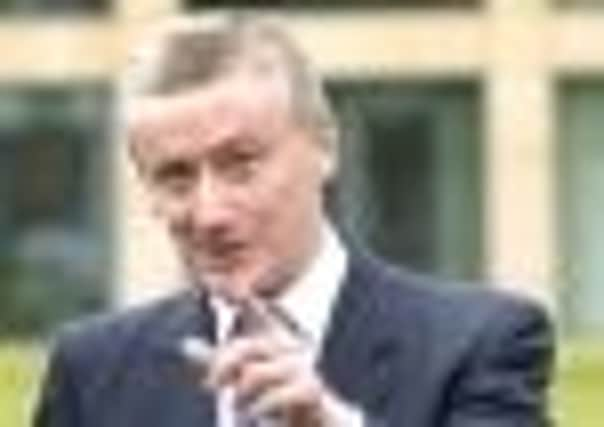Miliband: We were wrong to grant Sir Fred a knighthood


Launching an attack on predatory businesses at the Labour Party conference in Liverpool yesterday, Mr Miliband offered what amounted to an apology for handing the honour to the man whose actions led to RBS becoming effectively nationalised and brought the banking system to its knees.
With his own position again coming under pressure after Labour slipped behind the Tories in the polls this week, Mr Miliband gave a 55-minute speech aimed at persuading his party that he had a vision to lead them to victory.While he received two standing ovations and loud applause at the end, the speech appeared to fail to silence some critics who said he had yet to prove himself.
Advertisement
Hide AdAdvertisement
Hide AdThe Labour leader’s attack on “irresponsible predators and asset-strippers” sparked anger among business groups led by the CBI and Institute of Directors but pleased trade unions, which just a fortnight ago had booed him at the TUC conference.
In what was seen as a move to the left, Mr Miliband said that the party needed to be “pro-business”, but that this should mean “pro-producers”.
He compared Sir Fred with Sir John Rose, former chief executive of Rolls-Royce. He praised Sir John for “creating wealth and keeping jobs in this country”. “He is the true face of British business,” Mr Miliband said. “But at the time of the financial crisis, Fred Goodwin was paid over three times more than Sir John Rose.” And he added: “I tell you something, Fred Goodwin shouldn’t have got that salary. And I tell you something else: we shouldn’t have given Sir Fred Goodwin that knighthood either. You know what your values are.”
He told delegates that the choice was not between being pro-business or anti-business. “All parties must be pro-business today,” he said. “If it ever was, that’s not the real choice any more. Let me tell you what the 21st-century choice is: Are you on the side of the wealth-creators or the asset-strippers? The producers or the predators?”
His ire was also aimed at the big six energy companies, which he said must loosen their grip on the market and be broken up.
The speech sought to show the conference that he was his own man and had fully emerged from the shadow of his predecessor, Gordon Brown.
But along with his attack on some forms of businesses, he underlined that he had moved on from the Tony Blair era, in which leading Labour politicians courted senior figures in the financial industries and the media.
One of the loudest cheers he received from delegates was when he declared: “I am not Tony Blair.”
Advertisement
Hide AdAdvertisement
Hide AdHe also drew loud applause when he spoke of breaking the first rule of politics – “don’t mess with Rupert Murdoch” – the media baron whose empire has been hit by the phone-hacking scandal but was feted by both Labour and Tory leaders.
However, there was an echo of the man who led Labour to three election victories when he announced his concept of the “new bargain”, redolent of Mr Blair’s “new deal”.
He said: “The new bargain must demand responsibility from all. We’ve got to put an end to the idea that those at the top can take whatever they can, regardless of what they give back.” He added: “It’s why we must end the cosy cartels of the way top pay is set in our economy.”
But the new bargain also contained hints on a stronger attitude towards welfare, suggesting that people who work should get priority for council housing.He said that the new bargain would give power to the public: “Like the power to the elderly couple to choose whether they are cared for in a care home or in their own home.
“Or the parents I know struggling with their council on their child’s special needs who want to know who else is facing the same challenges.”
He declared war on the “vested interests” and “closed circles” that prevented people from receiving opportunities, describing himself as “the guy who is determined to break the closed circles of Britain”.
He claimed that Prime Minister David Cameron was “the last gasp” of the closed circles.But in a move that suggested he was unwilling to compromise or form a future coalition, he also attacked consensus.
“Nobody ever changed things on the basis of consensus,” he said. But while his attacks on Mr Cameron and Liberal Democrat Deputy Prime Minister Nick Clegg went down well with the audience in the hall, there was a deathly silence when he said Margaret Thatcher got some things right.
Advertisement
Hide AdAdvertisement
Hide Ad“Some of what happened in the 1980s was right. It was right to let people buy their council houses,” he said.
“It was right to cut tax rates of 60, 70, 80 per cent and it was right to change the rules on the closed shop, on strikes before ballots.
“These changes were right, and we were wrong to oppose it at the time.”
He also warned his party that it would have to accept a much tougher approach to the economy, saying that Labour had lost trust because of the banking collapse.
“The Labour Party lost trust on the economy and, under my leadership, we will regain that trust,” he said.
“I am determined to prove to you that the next Labour government will only spend what it can afford.”
The speech appeared to please the unions while it concerned business groups. Paul Kenny, GMB general secretary, said: “Ed Miliband may have taken the stage a year ago as a young man but today he emerged as a senior politician with courage, conviction and honesty.”
Miles Templeman, director general of the Institute of Directors, said: “He should have more faith in customers and investors to decide.”